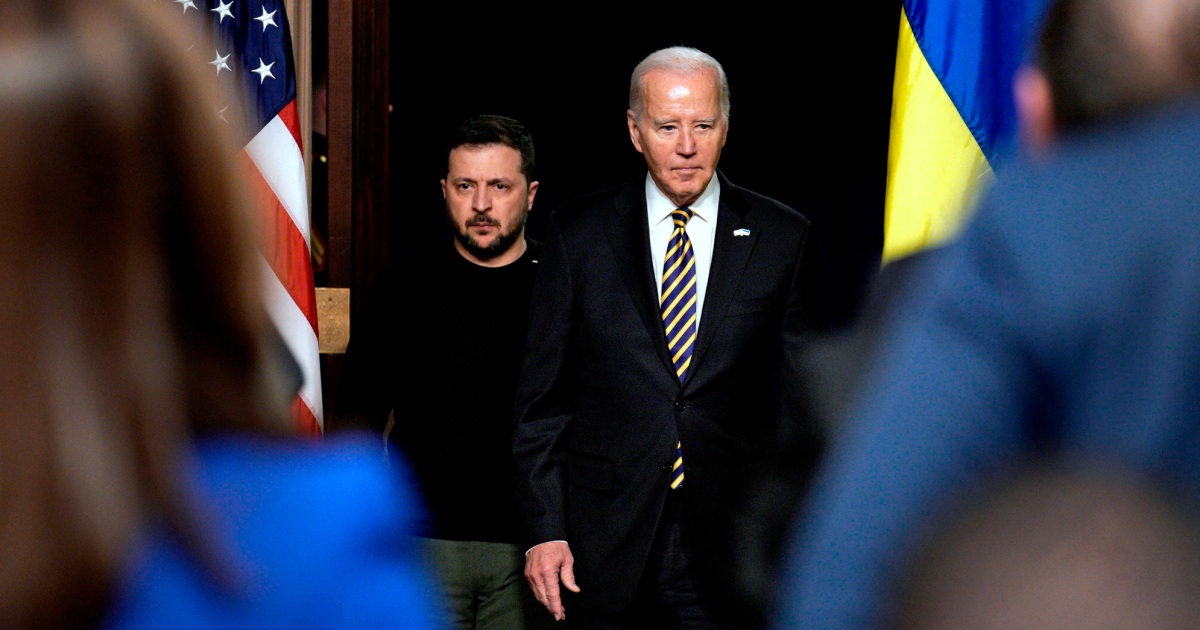
[ad_1]

President Joe Biden has long said he will support Ukraine in its goal of expelling Russia from its territory for “as long as it takes.” But a Politico report indicates that the Biden administration is quietly shifting away from backing Ukraine’s bid for total victory. Instead, the White House is now thinking about how to best position Ukraine for negotiations that are likely to lead to territorial concessions. The news underscores the failure of Ukraine’s widely watched counteroffensive and reflects concern about dwindling resources of both Ukraine and its allies to oust a heavily dug-in Russia.
It appears that the war could be entering a new phase.
Citing Biden administration officials and a European diplomat, Politico reports that the U.S. and Europe are discussing “the redeployment of Kyiv’s forces away from Ukrainian President Volodymyr Zelenskyy’s mostly failed counteroffensive into a stronger defensive position against Russian forces in the east.” That includes helping Ukraine fortify certain borders and positions, and helping strengthen the country’s defense industry. “The only way this war ends ultimately is through negotiation,” a White House spokesperson said, and the U.S. wants “Ukraine to have the strongest hand possible when that comes.” The spokesperson told Politico that talks haven’t been planned yet, and publicly the Biden administration insists that its support for Ukraine’s goal — the total expulsion of Russia — remains unchanged. But Biden hinted at cooling support in December, when he said the U.S. will support Ukraine “as long as we can” instead of the typical “as long as it takes.” It appears that the war could be entering a new phase, and we’re most likely in the early stages of a hugely consequential pivot by the Biden administration.
After Ukraine kicked off its widely anticipated counteroffensive over the summer, there were high hopes that its forces would be able to regain large swaths of territory. But Ukraine failed to win back much territory at all, and Russia has even wrested back some of the little land that Ukraine had fought hard to secure. Kyiv lacked the manpower, air power and financial resources to prevail against a far, far more powerful country that has assumed a defensive posture on its own territory. Russia remains in control of about 20% of Ukraine’s land, and it’s hard to see that changing any time soon.
In a sign of how poorly the counteroffensive was faring even in its first few months, in August the chief of staff to the NATO secretary-general floated the idea of territorial concessions to Russia as part of the solution to the war. At the time, he was slammed by Ukrainians and European diplomats for deviating from the Western position on the war, but it most likely reflected a growing sense of resignation about Ukraine’s capacity to defeat Russia on the battlefield. That resignation has since been echoed by Ukraine’s military commander in chief, Gen. Valeriy Zaluzhnyi, who told The Economist in November that the countries had reached a “stalemate” and that there “will most likely be no deep and beautiful breakthrough.” (Zelenskyy dismissed the characterization of a “stalemate.”)
In addition to a largely fruitless counteroffensive, American support for Ukraine has become limited. Republicans, under pressure from their base and Donald Trump, have repeatedly blocked aid to Kyiv. And the failed counteroffensive only makes it harder for the Biden administration to convince Congress that huge amounts of aid should keep flowing at the same pace they were in earlier stages of the war. There are also concerns about the speed at which Ukraine has depleted U.S. weapons stockpiles — and those concerns have become more urgent as the Israel-Hamas war could easily spark a regional conflagration in an area of paramount strategic importance to the U.S.
The question of how the Biden administration might help Ukraine prepare for negotiations is both a strategic one and a political one. One approach is helping Ukraine operationalize a “hold and build” strategy — bolster its weapons production and help its forces develop a strong enough position to deter major Russian offensives. Russian President Vladimir Putin has been signaling that he’s interested in negotiating a cease-fire that preserves Russian control over its territorial gains. But that doesn’t mean he wouldn’t try to launch another land grab. A stronger defensive position for Ukraine could help set the stage for negotiations.
As for politics, Biden’s presidential campaign introduces a whole host of variables tied to making sure he looks “strong” against Putin and competent as a foreign policy leader on the campaign trail. Even if Ukraine agrees to territorial concessions, the Biden administration could drag out the war out of fears that those concessions would make him look weak. Then again, given that Putin would rather negotiate over the fate of Ukraine with Trump, it seems unlikely that any major agreement could be made before Election Day.
The possibility that Ukraine may at some point end up effectively giving up a fifth of its territory to Russia is upsetting and infuriating. But it would still be a better outcome than what seemed likely in the early weeks of the war, when it was all but assumed that Russia would effortlessly topple Kyiv and take over most of the country. If a negotiated settlement involves giving up land, Ukraine will not have won the war, but it will still have impressively thwarted Russia from achieving its goal of total domination.
[ad_2]
Source link